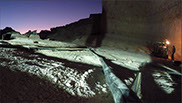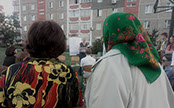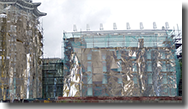METASITU
TDCU IZZ

The chronicle of increasing isolation of a group of artists attempting to reach the World's most remote human inhabited place, the island of Tristan da Cunha.
THE VISIT

Meziara is a village in Northern Lebanon, where most of its residents do business in Nigeria for most of the year, before returning every summer. The suburb to an invisible city.
TORA BORA

The extraction and export of 'Jerusalem Stone' is one of the most lucrative businesses in the Palestinian Territories, and remains highly unregulated. Everyone wants a piece of the holy land.
MEMENTO LOCI

Souvenirs are tokens that help to perpetuate spatial narratives. Mass produced around the world, they serve as a vehicle through which power narratives are unfolded and displayed.
MEMENTO LOCI unpacks some of these strategies.
14th DISTRICT

Slavutych was built to rehouse the workers of the Chernobyl Nuclear Power Plant. It is made up of 13 districts, each inspired by a different Soviet city. With 86, we are building a new district based on Athens.
STOP OVER CITY

Moscow City is a decaying business district in Central Moscow. By linking it to the two largest airports in the city and giving it the status of 'international transfer zone' we would revitalize this vacant territory.
STATES, STATUS,
STATUES & STATUTES

VDNHk park in central Moscow is a spatial technology that serves to advance an imperialistic idea based on an old regime.
(re)appropriating (post)soviet narratives.
NATION STATE OF MIND

Nation State of Mind proposes an alternative understanding of the nation in a post-national world. What is the role of territoriality and locality in Ecumenopolis?
#mariupolwillnotdie
#itistheworldthatwillend

Mariupol is a mono-industry town in Eastern Ukraine. Its population has been shrinking since the collapse of the USSR. This is a manifesto to embrace its shrinking condition and work with it.
EXPEDITION TO ECUMENOPOLIS

Expedition to Ecumenopolis is a series of workshops that we deliver to different groups in order to collectively think about ideas evolving around contemporary urbanism in the age of hyper-globalisation.
VOCABULARY FOR ECUMENOPOLIS

In the era of Globalization and the Antropocene, we find that there are a new set of urban qualities/phenomena that take place globally. Here is a glossary that attempts to identify some of those.
TORA BORA





















<
>
Among stone industry workers in Palestine, ‘Tora Bora’ refers to the layer of dust left on skin and clothes after visiting a quarry.
During a three-month period spent in Beit Sahour, Palestine, we visited the most prominent limestone quarries (where the so-called Jerusalem stone is quarried) and stone cutting facilities in order to trace the different aspects of the largely unregulated stone industry processes in Palestine—from the extraction of the stone, to cutting it, exporting it, and the regeneration of the resulting hollowed landscapes; mechanically-made canyons.
During the research process, we investigated the profanation of the land—“holy stone” from the “holy land”—a brand whose formation is indigenous to the fetishization of the object and is claimed by every religion and ideology around the world.
The result of the research, which included interviews with different stakeholders and field trips, was a video entitled Tora Bora. The starting point of this piece is the dust that seeps and stays with those who visited, cut, touched, or carried the Jerusalem stone. The only remainder for those who visited a territory that is physically disappearing. A nation of dust.
We followed the “dust” (the slabs of Jerusalem Stone) from the West Bank to Brazil – from the moment the stone is removed from the bedrock in a quarry near Hebron, transported to the stone cutting factory, cut in tiles and exported, via the Israeli port of Ashdod, to its use as an actual wall cladding for the largest Christian Pentecostal church in Sao Paulo, Brazil. Whereas in Palestine we had seen a hollowed mountain, in Brazil we witnessed its negative: the Third Temple of Solomon. A game of voids and fills that responds not only to offer and demand but to the intricate geo-political context of ‘unregulation’, occupation and exploitation that is embedded in the Palestinian stone industry today. The material was brought into the country avoiding the import tax for construction materials, as the stone slabs where labeled as “holy objects:” they were, after all, coming from the “holy land.” This practice was representative of the global phenomena of usurping ideology/mythology in order to support neoliberal networks of resource extraction and distribution.
Voice: Shehrezade Al-Ayoubi
ECUMENOPOLIS
Rethinking the future of the stone industry in Palestine
3 Channel Video Installation/ 7’34’’ ----- 2016
US